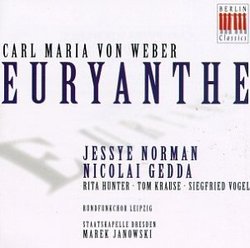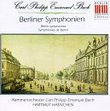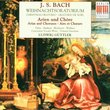| All Artists: Carl Maria von Weber, Staatskapelle Dresden, Marek Janowski, Jessye Norman, Nicolai Gedda, Rita Hunter, Tom Krause, Siegfied Vogel, Harald Neukirch, Renate Krahmer, Rundfunkchor Leipzig Title: Weber: Euryanthe / J. Norman, Gedda, R. Hunter, Krause, S. Vogel; Janowski Members Wishing: 0 Total Copies: 0 Label: Berlin Classics Original Release Date: 1/1/2008 Re-Release Date: 11/29/1994 Genre: Classical Style: Opera & Classical Vocal Number of Discs: 3 SwapaCD Credits: 3 UPC: 782124110826 |
Search - Carl Maria von Weber, Staatskapelle Dresden, Marek Janowski :: Weber: Euryanthe / J. Norman, Gedda, R. Hunter, Krause, S. Vogel; Janowski
 | Carl Maria von Weber, Staatskapelle Dresden, Marek Janowski Weber: Euryanthe / J. Norman, Gedda, R. Hunter, Krause, S. Vogel; Janowski Genre: Classical
|
Larger Image |
CD DetailsSimilar CDs |
CD ReviewsFor Gedda, Hunter & Weber K. Can | France | 01/18/2003 (5 out of 5 stars) "Buy it for gedda,Hunter and of course WEBER- What a beautiful music.. Perfect recording.. You'll need the libretto to understand miss Norman" BROADFLOWER DAVID BRYSON | Glossop Derbyshire England | 04/26/2007 (5 out of 5 stars) "That's the meaning of `Euryanthe', as of course you knew. It is Weber's most advanced effort in the field of opera and it is a truly lovely thing, a flower that opens out to us from its very opening bars and never fades throughout nearly 3 hours of music. This is a worthy performance too, if not quite the equal of Kleiber's great Freischuetz. The original recording was done in 1974 in what was then East Germany. Digital remastering has been an unqualified benefit in this instance, with none of the characteristic `edge' that the process often creates around the sound. I found the tone of the woodwind early on to be uncommonly mellow and beautiful, and when the brass had its turn I greatly liked the sound of that too. The violin tone was rather more average, without the bloom that I would have preferred ideally. However that may not be something I should attribute to the recording, as the sound of the solo voices is slightly variable as well. There is a slight sense of strain about Rita Hunter's voice in her great `jealousy' aria near the end of act 1 for instance, whereas there is never anything of the kind when it comes to Jessye Norman. Gedda as Adolar always sounds fine but not quite as can really sound on his day, as for instance in his Verdi requiem with Giulini, whereas Tom Krause as Lysiart (and for that matter Siegfried Vogel as the King) always sound magnificent. A more probable conclusion is that although all the singing is good some of it is better than other some. In particular, all the cast are slightly overshadowed by the voice of Jessye Norman as Euryanthe, a voice that in its glorious prime was surely one of the greatest in the entire 20th century. They sing well in solos, they sing well in duets, and the chorus completes the listener's pleasure by performing superbly as well - how much better Weber's choral writing is than Wagner's, I found myself thinking. All is well at the dramatic level too. Janowski strikes me as having this score in his bones, all the way from his flexible and expressive handling of the overture through the beautiful extended preludes to the later acts to the fine excited and exciting ending. He draws great but very natural and unforced eloquence from his players, doing justice to the composer's superb orchestration, and I had the feeling throughout that the singers were comfortable with him. There was not a single tempo that I found inappropriate, and this fine group of soloists is given the opportunity to shine in the great string of jewels that Weber has provided for them. Stylistically it seemed right to me as well. Power is sometimes called for of course, but Weber does not require singers to sing to split their lungs as Verdi so often does, and these singers, great Verdian artists, know the difference. Whether in the more melodramatic sequences or in the gentler and more reflective parts they all remember the great rule in this great piece - first, last and always stay musical and lyrical. I have no real criticism to offer regarding the production and editing. The text is sensibly given in German and English only, although for some reason the liner essay appears in French too. The English translation is anonymous, which is slightly unfair to the translator as it is much better English than we often find in such cases. There is a summary of the plot, but I had to read the entire text before I could understand the summary. Whatever Helmine von Chezy's shortcomings as a poet at least her plot-line is a model of clarity. As I said, not quite the equal of Kleiber's Freischuetz, but that would have been a tall order. It's easily good enough for me. If there are other versions around that surpass this one in certain respects, they would still have to overcome the near-insuperable challenge of finding a Euryanthe to equal Jessye Norman." Weber at his best in invention and creativity! Rev. Ben Cox | Orlando, Florida | 04/09/2010 (5 out of 5 stars) "During my university years, I played in both the band and orchestra. In both organizations we did many "old chestnuts" including the overtures of Weber such as Der Freischutz, Oberon and Euryanthe. That was all of the Euryanthe music I knew. So when I saw that this recording was available, especially with Jessye Norman, I had to hear it. I saw her do Aida live once and the voice is a veritable Niagara! I am impressed in this recording with the singing, the orchestral playing, but above all with Weber's wealth of invention and creativity when challenged with a story difficult to put to music and to stage. He certainly rises to the occasion! At this point, Weber seems to be in transistion, leading us towards the point where Wagner will take off. The music becomes more continuous with less stops and starts. Like Mozart, one wonders where Weber would have ended up musically, had he lived longer. This is a beautiful opera, well sung and well recorded. Credit goes to the singers, especially Jessye Norman, to the orchestra and to Marek Jankowski, who obviously knows and loves this music. This opera deserves to be staged and heard much more in the public arena."
|

 Track Listings (15) - Disc #1
Track Listings (15) - Disc #1

